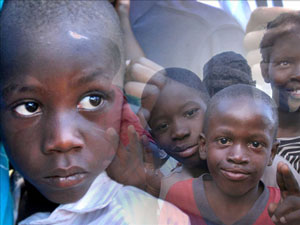CHARLENEM

(FinalCall.com) – Some child advocates and human rights groups are calling for an immediate end to adoptions of Haitian children in the aftermath of the 7.0 earthquake that toppled its capital Port au Prince. The instinct to help by taking children out of the country could have horrible results, they said.
As of January 25, 363 Haitian orphans had been evacuated and hundreds more were awaiting evacuation, according to the State Department. Scrutiny of the departure of Haitian children grew as national news networks frequently showed images of primarily Caucasian American couples leaving the devastated region with Black youngsters in tow.
“The U.S. military that has more or less invaded Haiti has the ability to build structures relatively quickly. In a war zone they can put up an airport in a day, so they have the resources to ensure housing, food and medical care for these children while this is being sorted,” argued Margaret Prescod, an activist with the Women of Color in the Global Women’s Strike. “They cannot use the excuse of the devastation around to go and adopt somebody’s child out. This (adoption) is not temporary.”
Phillip Crowley, a State Dept. assistant secretary, told reporters at a Jan. 25 press briefing that the department’s main concern is that any child that comes to the U.S. has been cleared for adoption. The State Dept. is working with the Haitian government to make sure there is a thorough process, he added.
Other voices demanding an end to the adoptions include the National Association of Black Social Workers, the Adoptees of Color Roundtable, Save the Children, and Many Hands Effort.
Adoptees of Color is concerned with domestic and international adoptees, including scholars, activists, professors, artists, lawyers, social workers and health care workers. The group says an inter-country adoption industry has profited from population control policies, unsustainable development, corruption, and child trafficking.
Removing the children without proper identification violates their basic human rights, and separation from their loved ones could further traumatize them, the group said.
Ms. Prescod and others say food, shelter, and protection should be extended to orphanages in Haiti until the situation is sorted out.
Nehanda Sankofara, president of Mothers for Africa, a non-profit group that works to alleviate suffering in Africa, said the images of Americans shuttling the children away from Haiti right after the devastation reminded her of a foiled kidnapping scheme involving children in Chad by Europeans who claimed they were humanitarian workers.
The group was arrested on October 25, 2007 while attempting to fly out children they claimed were injured orphans to Europe. Eighteen people were charged with trying to abduct more than 100 children, which aid groups found were from villages in Chad and who had parents.
“I saw a few clips of them and all were the same story, ‘Our paperwork was lost in the earthquake so we just flew down.’ Is there an investigation being done? I really don’t like when people come from outside a country to adopt babies in the first place, but when you don’t even have a background check on these people, that’s very scary and I’m worried about Haiti right now,” Ms. Sankofara told The Final Call.
Unsure of what recourse Haitian families have, she suggested even in the midst of trouble, there should be an immediate end to babies being flown out of Haiti to allow the government to determine the next steps.
“There are enough supplies. Everybody’s giving to Haiti right now and there’s enough money to take care of the babies temporarily until they get their government back in order,” Ms. Sankofara said.
For Dr. Gloria Batiste-Roberts, president of the National Association of Black Social Workers, the reference point was children in the wake of Hurricane Katrina. Many were evacuated and separated from families but were too young to identify their own names or family photographs, she recalled.
These children would be better served if temporarily placed with Haitians in America until they can be reunited with family, said Dr. Batiste-Roberts. “We believe that they should stop sending the children off with people who do not understand their language or culture. So we’re exploring alternatives with Black adoption agencies and trying to develop a strategic plan on how to better handle this to ensure that children are in appropriate homes and protected from premature adoptions.”
Save the Children, a United-Kingdom based advocacy group working to help reunite separated children with their families, said the organization has received many calls from well-intentioned people who want to bring children to foster or adoptive homes in the U.S. and other countries. But the organization has asked governments and international organizations to respect Haitian law on the movement and adoption of children.
Days after the earthquake, Janet Napolitano, Homeland Security secretary, granted humanitarian parole for hundreds of children the department says had already been identified as orphans. The children also had to have been deemed eligible for inter-country adoption by Haiti prior to the earthquake and in the adoption process. The children had to have been identified by an adoption service provider or facilitator as adoption eligible, and matched with prospective parents, according to federal officials.
“It’s an outrageous situation. I understand that there are some people who are well meaning and who see it is as the children are suffering. They look as though they don’t have anywhere to go and nobody to take care of them, and (people) want to pitch in and help but this is really not the way to do it,” said Ms. Prescod.
Related news:
- Haiti – Support for National Mobilization grows (FCN,01-26-2010)
- Haiti – Profiting from misery? (FCN, 01-26-2010)
- Farrakhan calls for national mobilization for Haitian relief (FCN, 01-19-2010)
- Analyzing Haiti’s history of hardship (Web Video, 01-14-2010)
- Disaster hits Haiti: Magnitude 7.0 Earthquake (FCN, 01-13-2010)












